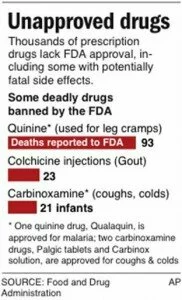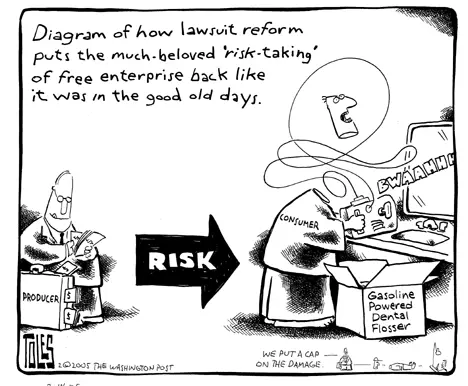Dr. Nancy Snyderman of the Today Show reported this morning on the growing number of Americans who use prescription drugs, and in many cases several prescription drugs, to treat chronic illnesses.
One of the issues the report raises is the importance of being aware of potential drug interactions; be sure to talk with your doctor and pharmacist, and to use online tools like DoubleCheckMD, to ensure that your drug regimen is safe.
A group of students at California Northstate College of Pharmacy put together this short video on the dangers of sharing prescription drugs like penicillin and Adderall. (Remember, they’re training to be pharmacists — not actors.)
The Day of New London, Conn., has a nice article on Dr. Peter Rost’s bid for FDA commissioner. Here’s an excerpt referencing our interview with Peter:
If Pfizer Inc. were to describe its worst nightmare, it might very well be seeing former company whistleblower Peter Rost become commissioner of the U.S. Food and Drug Administration.
So guess who is actively seeking the FDA’s top post?…
Rost said he is looking for a shakeup of the FDA, including a reorienting of the agency’s priorities from serving the drug industry to helping American citizens.
â€That means the agency would focus not only on the fastest and most efficient processing of new drug applications, but would also ensure that unsafe drugs are taken off the market or labeling (is) revised in a more timely manner,†Rost said in an interview this week with eDrugSearch. com, which endorsed his candidacy.
Some of Rost’s most controversial stances include his views on reimportation of drugs from Canada, which he approves, and his opposition to direct-to-consumer advertising.
â€DTC advertising is not part of a ‘free market’ – it is part of manipulation of consumers who don’t know better and doctors who give the patient whatever they ask for,†Rost said.
 An Associated Press analysis last week concluded that millions of Americans are being prescribed drugs — including those covered under Medicaid — that have never been reviewed by the FDA for safety and effectiveness. The FDA admits there may be thousands of such drugs on the market. Reports the AP:
An Associated Press analysis last week concluded that millions of Americans are being prescribed drugs — including those covered under Medicaid — that have never been reviewed by the FDA for safety and effectiveness. The FDA admits there may be thousands of such drugs on the market. Reports the AP:
“At a time when families, businesses and government are struggling with health care costs and 46 million people are uninsured, payments for questionable medications amount to an unplugged leak in the system … But the FDA estimates they account for 2 percent of all prescriptions filled by U.S. pharmacies, about 72 million scripts a year.”
This isn’t a new problem — most of the drugs in question have been on the market for five decades or more — but it’s a story that gets more galling over time. The history is, it was only in 1962 that the FDA began reviewing new medications for safety. Medications already on the market at that time were to be vetted by the FDA eventually … but 46 years later, thousands of meds have never been reviewed at all.
According to the AP:
It might be easier to sort things out if the FDA compiled a master list of unapproved drugs, but the agency hasn’t. FDA officials say that would be difficult because many manufacturers do not list unapproved products with the agency. Yet, the AP found many that were listed — a possible starting point for a list.
Among the drugs the AP’s research identified were Carbofed, for colds and flu; Hylira, a dry skin ointment; Andehist, a decongestant, and ICAR Prenatal, a vitamin tablet. Medicaid data show the program paid $7.3 million for Carbofed products from 2004 to 2007; $146,000 for Hylira; $4.8 million for Andehist products, and $900,000 for ICAR…
Federal law does not provide fines for selling unapproved drugs, and criminal prosecutions are rare.
This is another instance where it’s in your interest to do your own research on the drugs you are prescribed. Many doctors and pharmacists are unaware that drugs they are prescribing and dispensing have never been vetted by the government — but you can find out for yourself with a little Internet searching.
Drugs@FDA is an FDA Web site that allows you to search government-approval information on “most of the drug products approved since 1939.” Additionally, the site includes “the majority of labels, approval letters, reviews, and other information available for drug products approved from 1998 to the present.”
The FDA offers other resources for determining if a drug is approved here.
For FDA updates and AP news on 200 of the most commonly prescribed drugs, you can also check out eDrugSearch.com’s Online Pharmacy Dictionary.
 We assume that eDrugSearch.com users already take Wikipedia with a grain of salt, but just in case you needed some further convincing:
We assume that eDrugSearch.com users already take Wikipedia with a grain of salt, but just in case you needed some further convincing:
AttorneyatLaw.com reports that Wikipedia entries on prescription drugs “may exclude important information about life-threatening side effects and drug interactions,” according to researchers from Nova Southeastern University in Palm Beach Gardens, Florida.
As you know, we at eDrugSearch.com are all about healthcare consumers empowering themselves by learning about drugs online. We think our online pharmacy dictionary is an excellent source for this information, because it is comprised of data from sources like the FDA and, for breaking news updates, the Associated Press. In addition to our online pharmacy dictionary, there are a number of other good sources out there as well.
Unfortunately, Google is in love with Wikipedia — which means that when you search for many prescription drug names, the Wikipedia entry is one of the first selections that will pop up in your browser. Please, resist the urge to base any medical decisions on information on Wikipedia; use it only as a starting point for further research — both online and in consultation with your doctor or pharmacist.
 PharmacyChecker.com is the leading verification authority for online pharmacies in the United States and Canada. Google requires all pharmacies in its ad network to receive PharmacyChecker verification, and eDrugSearch.com requires all member pharmacies to have PharmacyChecker verification as well.
PharmacyChecker.com is the leading verification authority for online pharmacies in the United States and Canada. Google requires all pharmacies in its ad network to receive PharmacyChecker verification, and eDrugSearch.com requires all member pharmacies to have PharmacyChecker verification as well.
PharmacyChecker has just produced a free five-page pdf report called “Safe Strategies for Drug Savings.” It offers the following five strategies:
1. Check brand name prices at Canadian and non-U.S. online pharmacies.
2. Check brand name prices at U.S. online and wholesale pharmacies.
3. Check discount generic programs at large retailers and pharmacies.
4. Check wholesale pharmacy prices on generics.
5. Check programs based on need or fees.
By doing your homework, PharmacyChecker concludes, you can save more than 70 percent on brand name drugs and close to that on generic drugs.
Download the report here.
From the Wall Street Journal Law Blog:
After the arguments wrapped up in Wyeth v. Levine…we called around and spoke to a couple lawyers who were present at the scene. Based on those convos, and an AP report, we were able to cobble together an overview of the back-and-forthing…
…the Justices took issue with Wyeth’s argument that it couldn’t update its label to add stronger warnings without first getting FDA approval. “Wyeth could have gone back to the FDA anytime†to update the label, said Justice Souter. “And it simply didn’t do it.â€
But Seth Waxman, who argued the case for Wyeth, argued … that, when the FDA has specifically considered the risk involved and rejected the sort of warning that Diana Levine seeks, then the claim is preempted because it directly conflicts with the FDA’s own determination.
The plaintiffs, on the other hand, argue that the FDA regulations are merely a floor, not a ceiling, and that state tort law augments those regulations by providing companies with incentives to inform of all possible risks…
Indeed, when Justice Kennedy asked Levine’s lawyer when preemption should apply, the lawyer said that if the FDA had adequately weighed the risks and benefits … and included those details on the label, then his client wouldn’t have a case. However, the lawyer argued, those details weren’t provided. Therefore, preemption doesn’t exist in this case.
Sounds to me like the Levine argument is more than reasonable. She was awarded $6 million after having her arm amputated — which also sounds reasonable.
Why on earth would ANYONE favor government deregulation AND the de-fanging of our tort system? Without both of these protections, consumers are completely powerless when they are injured by the actions or negligence of large corporations.
Please, don’t buy into this nonsense about tort reform being about people who are awarded $100 million dollars for spilling hot coffee on themselves. That just doesn’t happen — and in the very rare instance when it does, the monetary award is always subsequently reduced or eliminated (even if this reduction doesn’t make the headlines.)
If you want to know how hard it is for people to collect money from large corporations or wealthy individuals who have wronged them, look at the Exxon Valdez case — or the O.J. Simpson civil case for that matter. Neither Exxon nor Simpson have paid a dime since those big-money judgments made the news.
The tort reform movement is funded by large corporations. They fund tort reform because they want to make more money, plain and simple. If you buy into it, you’re not reducing your costs — you’re just increasing their margins. You’re playing into their hands.
A decision on Wyeth v. Levine is expected this week. Kaiser has a great overview of the case here.
People’s Pharmacy is an excellent syndicated column that you should definitely check out if you aren’t already reading it. If it’s not in your hometown paper, you can find them online here. The writers, Joe and Terry Graedon, have been impassioned advocates for healthcare consumers for more than 30 years.
(Here’s what the Graedons have to say about Canadian pharmacies, by the way: “The FDA won’t admit it, but buying drugs from legitimate Canadian pharmacies may be safer than buying from the drugstore down the block.”}
I bring up the Graedons because their column recently reminded me about a very important issue that had fallen off my radar screen. Today, the U.S. Supreme Court is scheduled to begin hearing arguments on Wyeth v. Levine, a case that could leave consumers powerless to get redress if they are injured (or worse) by medications that don’t work as promised.
Washington oddsmakers predict the pro-business justices will rule in favor of the drugmaker Wyeth over Diana Levine (pictured). Here’s an excerpt of the Graedons’ column:
Does Food and Drug Administration approval guarantee safety? If the Supreme Court rules as expected, patients might have no legal recourse if they are harmed by an FDA-approved medicine. The case that will soon be decided by the Supreme Court involves a musician who was treated for a migraine. The medicine that was injected to stop her nausea was administered incorrectly. This led to gangrene of her arm and eventual amputation just below the elbow.
The Vermont Supreme Court upheld a Superior Court finding that the drug company was negligent because it did not provide adequate warning about the injection process. The manufacturer maintains that the FDA approved the prescribing information that was used and therefore the drug company has no liability.
In other words, FDA approval could get the pharmaceutical firm off the hook for any complications that might arise…This case could well set a precedent for all future pharmaceutical-related litigation. If FDA approval means that drug companies are not liable, then there will be no recourse if someone experiences a serious or even deadly adverse reaction.
Anyone who’s been watching the machinations of Big Pharma and the Bush Administration over the past decade already knows the following:
– The FDA has had its staff and other resources dramatically slashed in the past eight years.
– Not coincidentally, the FDA has been involved in more scandal for approving dangerous drugs than at any time since its formation.
– The FDA is infested with Big Pharma lobbyists, further tying its hands to adequately regulate potentially dangerous medications.
In this environment, where Big Pharma is pushing drugs through the FDA with less resistance than ever, where staff is stretched thin and conflicts of interests are pervasive, do we really want to give Big Pharma a free pass if the FDA approves (as it inevitably will) another drug that turns out to be harmful?
I sure don’t.
FDA approval should be the floor, not the ceiling, when it comes to consumer protection.
You can read more about the Levine case — and how we reached this point — here. If you’re not already familiar with the case, I’m guessing it will make your blood boil.
Consumer Reports has published a valuable article identifying common prescription drugs that can be dangerous for older patients. Healthcare consumers over age 65 are more than twice as likely to suffer from adverse drug reactions; the publication lists the following drugs as posing a high enough risk that they should be avoided if possible:
-
Antianxiety drugs
Chlordiazepoxide (Librium, Limbitrol); diazepam (Valium); quazepam (Doral)
Recommended alternatives: alprazolam (Xanax), lorazepam (Ativan), and oxazepam (Serax)
-
Antidepressants
Amitriptyline, doxepin (Sinequan) and Fluoxetine (Prozac)
Recommended alternatives: citalopram (Celexa), paroxetine (Paxil), and sertraline (Zoloft)
-
Antihistamines
Chlorpheniramine (Chlor-Trimeton); diphenhydramine (Benadryl)
Recommended alternatives: Cetirizine (Zyrtec); fexofenadine (Allegra); loratadine (Claritin)
-
High blood pressure and enlarged prostate drugs
Doxazosin (Cardura); prazosin (Minipress); terazosin (Hytrin)
Recommended alternatives: Diuretics for high blood pressure; tamsulosin (Flomax) for enlarged prostate.
-
Pain relievers
Naproxen (Aleve, Naprosyn); oxaprozin (Daypro); piroxicam (Feldene); Meperidine (Demerol)
Recommended alternatives: acetaminophen (Tylenol); ibuprofen (Advil ); capsaicin cream (Zostrix); morphine
-
Sleeping pills
Barbituates (Butisol, Nembutal, Seconal); diphenhydramine (Sominex); flurazepam (Dalmane)
Recommended alternatives: zaleplon (Sonata) and zolpidem (Ambien)
-
Stomach drugs
Bisacodyl (Dulcolax); Diphenoxylate (Lomotil)
Recommended alternatives: Increased intake of fiber and fluids; change in diet; loperamide (Imodium AD)
 Can you hear that? It’s the sound of political spinning, twirling and flip-flopping — followed closely by backbones turning to mush.
Can you hear that? It’s the sound of political spinning, twirling and flip-flopping — followed closely by backbones turning to mush.
In the face of a relentless disinformation campaign (and lots of campaign donations) by the pharmaceutical industry and its front groups over the past several months, both Barack Obama and John McCain are showing strong signs of backing down — in unison — from their pledges to legalize Canadian drug reimportation if they are elected.
Call them the Flying Wallendas of Flip-Flops. For guys who claim to be about change — with McCain having the nerve to boast that he “took on the drug industry” in his campaign ads — they are beginning to spew the same old song and dance when it comes to prescription drug policy. I suppose that’s because Big Pharma dollars aren’t red or blue; they’re green.
Reports Reuters, which spoke to an adviser for each candidate:
Neither adviser said their candidate had abandoned reimportation, but had realized it would be more difficult … Groups representing brand-name and generic drugmakers, including GPhA, oppose reimportation, saying it could allow more unsafe products into the country.
So, why the impending flip-flop?
Big Pharma has been working overtime to scare people into thinking Canadian drugs aren’t safe. What is their argument in making this charge?
That the FDA is incompetent to do its current job — and certainly can’t be expected to properly regulate drugs coming in from foreign countries.
After the massive FDA failures of the past couple of years, it’s hard to argue that the FDA has its act together. But let’s take a step back for a moment.
The FDA was one of America’s most trusted and respected regulatory agencies in the ’70s, as public opinion polls at that time made clear. Then, first in the ’80s and then again in this decade, politicians favoring deregulation (and funded by the pharmaceutical industry) slashed the FDA’s staff, budget and power. By the end of Bush’s first term, the agency was a shell of its former self.
And now we wonder why we’re having problems with drugs coming in from China?
If you are naive enough to believe that Big Pharma is actually concerned about the safety of the public (rather than protecting its profits) when it opposes Canadian drug reimportation, ask yourself this question: Is Big Pharma in favor of the federal government rebuilding a strong — and independent — FDA?
The answer is no. It’s not. It just wants to scare the public away from Canadian drugs. When Obama and McCain complete their flip-flops, Big Pharma will have won. And then it’s back to business as usual.
I’m sorry if this sounds cynical — but this stuff has been happening too long to sugar-coat. We’ve been in the grip of the pharmaceutical industry for far, far too long.
Ironically, The Wall Street Journal is now wondering if there is still even demand for Canadian drugs among U.S. consumers, given the discontinuation of some state and municipal reimportation programs for lack of interest.
The reality is, there’s very strong public demand for Canadian drugs — which persists in the face even of Big Pharma’s most shameful scare tactics. Programs like the one the Journal cites in Boston failed because consumers don’t need the government involved in this way; they can purchase drugs from Canada directly using tools like PharmacyChecker and eDrugSearch.com to verify a pharmacy’s licensing and accreditations.
And that’s what they do. It’s also what they’ll continue to do in 2009 and beyond, in either an Obama or McCain administration.
-
-
Search Blog Posts
-
Save Even More Money!
-

-
Trending Content
-
Watch our YouTube Video
-
Categories
Big Pharma Buy prescriptions online Canadian drugs Drug costs Drug reimportation Drug safety eDrugSearch.com FDA Health 2.0 Healthcare100 Healthcare blogs Healthcare solutions Low-cost drugs Medicare Part D Merck Online pharmacies Online pharmacy safety Pfizer Pharma bloggers Pharmaceutical companies Pharmaceutical marketing Pharma cheerleaders Prescription drug abuse Prescription drug prices Prescription drugs Prescriptions Wal-Mart drug plan -
Blogroll
- Bullet Wisdom
- Bulverde Business Directory
- Christian Counseling San Antonio Tx.
- Christian Schools in San Antonio Texas
- Christian Social Network
- Christians United for Israel
- DrugWonks.com
- Eye on FDA
- GoozNews
- Health 2.0
- Hunting Forum
- In the Pipeline
- Jesus Christ Our King
- John Hagee Ministries
- Kevin, M.D.
- Local Search Marketing
- My $299 Website
- Pharm Aid
- Pharma Marketing
- PharmaGossip
- Pharmalot
- San Antonio Asphalt
- San Antonio Life Insurance
- San Antonio Pressure Washing
- Storage New Braunfels Tx
- Texas Wildlife Supply
- The Angry Pharmacist
- The Health Care Blog
- The Peter Rost Blog
- World Vision
-
Tags
big pharma Canadian drugs canadian pharmacies canadian pharmacy consumer reports craig newmark divine healing Drug costs drug prices Drug reimportation eDrugSearch.com FDA Fosamax Generic drugs healing scriptures Health 2.0 healthcare reform Hypertension Jehova Rophe Jesus Christ Lipitor Metformin miracles nabp online pharmacy dictionary online prescriptions osteoporosis peter rost Pharmacies pharmacists pharmacychecker pharmacy spam phrma Prescription drugs prescription medication Proverbs 3:5-8 reimportation relenza Roche saving money SSRI swine flu Tamiflu The Great Physician The Lord our Healer -
Recent Tweets
- eDrugSearch Blog Rank on the Healthcare100: http://t.co/VJprL4LZWl [#]
- New blog posting, How to Get Prescription Medication Without Health Insurance - http://t.co/1ZdLavB87d [#]
- 10 Tips for Safer Prescription Drug Use http://t.co/GFnMIN1mCy [#]
- New blog posting, How to Beat High Drug Prices By Comparing Low Cost Pharmacies - http://t.co/fsZ0stNZme [#]
-
Archives
-
Recent Comments
- Heather Sturges on What is the Difference Between Effexor and Cymbalta?
- Lupe Machol on Cost of diabetes drugs has nearly doubled
- Manpower For Hospital In Pune on Why is Medicine Cheaper in Canada?
- Jen on How a Canadian Pharmacy Can Help You Offset Drug Price Hikes
- nino iarajuli on Vending machine dispenses prescription drugs

